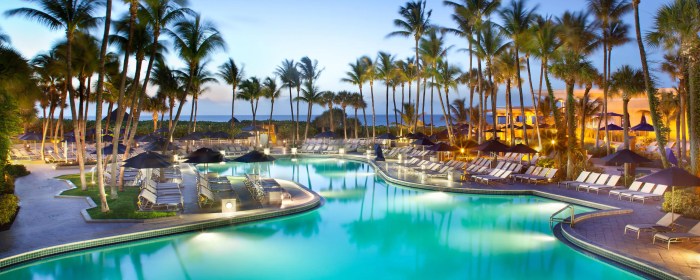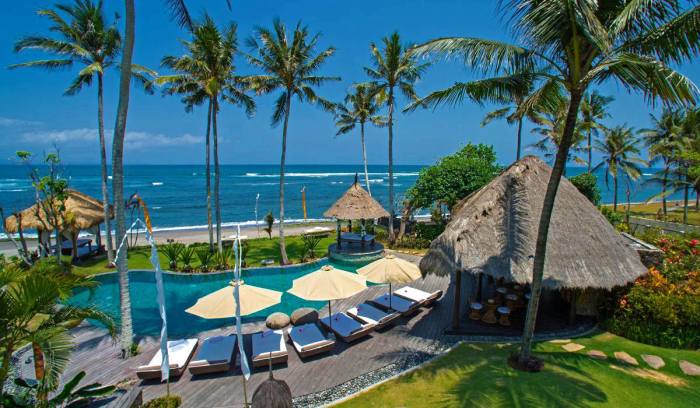Luxury Beachfront Hotels represent the pinnacle of upscale travel, offering an unparalleled blend of opulence, service, and breathtaking coastal locations. These havens cater to discerning travelers seeking more than just accommodation; they desire an immersive experience, meticulously crafted to exceed expectations. From the moment guests arrive, they are enveloped in an atmosphere of refined elegance, where personalized service and lavish amenities seamlessly intertwine.
This guide delves into the multifaceted world of luxury beachfront hotels, exploring their defining characteristics, target markets, and the key elements that contribute to their success. We will examine the amenities and services that set them apart, analyze their strategic locations and architectural designs, and investigate effective marketing and branding strategies. Furthermore, we’ll discuss the increasing importance of sustainability and social responsibility within this exclusive sector of the hospitality industry.
Defining Luxury Beachfront Hotels

Source: marriott.com
Luxury beachfront hotels represent the pinnacle of hospitality, offering an unparalleled blend of opulence, service, and breathtaking oceanfront locations. They cater to discerning travelers seeking an exceptional and memorable experience, exceeding the expectations of a standard beach vacation. The defining characteristics extend beyond simply having a beach view; they encompass a holistic experience designed to indulge and rejuvenate.
Luxury beachfront hotels are differentiated from standard beachfront hotels primarily through a combination of superior amenities, personalized service, exclusive location, and a higher price point. While a standard beachfront hotel might offer basic amenities and adequate service, a luxury establishment goes above and beyond, providing bespoke experiences tailored to individual guest preferences. The location itself plays a crucial role; luxury hotels often occupy prime beachfront real estate with unparalleled views and easy access to the ocean.
The target clientele for luxury hotels typically comprises high-net-worth individuals, celebrities, and discerning travelers willing to pay a premium for an exceptional experience.
Amenities in Luxury Beachfront Hotels
The amenities offered at luxury beachfront hotels are significantly more extensive and luxurious than those found in standard hotels. Expect private villas or suites with lavish décor and private balconies offering panoramic ocean views. Beyond the accommodation, guests can anticipate access to multiple restaurants offering fine dining experiences, world-class spas with extensive treatment menus, state-of-the-art fitness centers, private pools, and exclusive beachside cabanas.
Concierge services are typically personalized and readily available to arrange private excursions, transportation, and other bespoke requests. Some properties might also include private butlers, dedicated chefs, and other personalized services.
Service Standards in Luxury Beachfront Hotels
Service is a paramount differentiator. Luxury beachfront hotels pride themselves on anticipatory service, where staff members proactively address guest needs before they are even voiced. This might include remembering guest preferences, anticipating requests, and providing seamless and efficient service across all aspects of the hotel experience. Staff are highly trained, professional, and attentive, often exhibiting a level of personalized attention that goes beyond the typical hotel experience.
A high staff-to-guest ratio ensures personalized attention and immediate response to any request.
Location and Target Clientele
Luxury beachfront hotels are strategically located in highly desirable and exclusive destinations, often in secluded areas known for their pristine beaches and tranquil ambiance. These locations often provide easy access to local attractions, activities, and cultural experiences, enhancing the overall guest experience. The target clientele is typically affluent individuals and couples, families seeking a high-end vacation, and corporate executives who value privacy, comfort, and exceptional service.
The hotels often cater to specific niche markets, such as honeymooners, families with children, or those seeking adventure and wellness experiences.
Price Points in the Luxury Beachfront Hotel Market
The price points for luxury beachfront hotels vary considerably depending on location, amenities, and seasonality. A nightly rate can range from several hundred dollars to several thousand dollars, with some properties offering bespoke packages exceeding tens of thousands of dollars for extended stays. Factors such as the size and features of the accommodation, access to exclusive amenities, and the overall level of personalized service all contribute to the price.
Peak seasons and special events will also influence the pricing structure. For example, a luxury hotel in the Maldives during peak season may command significantly higher rates than during the off-season.
Hypothetical Luxury Beachfront Hotel: “Azure Shores Resort”
The Azure Shores Resort is a hypothetical luxury beachfront hotel situated on a secluded cove in the Caribbean. Its unique selling proposition centers on unparalleled privacy, personalized wellness experiences, and sustainable luxury. The resort features private villas with plunge pools and direct beach access, a holistic wellness center offering personalized yoga, meditation, and spa treatments, and a farm-to-table dining experience emphasizing locally sourced, organic ingredients.
The resort also prioritizes environmental sustainability through initiatives like solar energy, water conservation, and partnerships with local conservation organizations. This combination of exclusive privacy, personalized wellness, and sustainable practices differentiates Azure Shores from competitors and attracts a discerning clientele seeking a transformative and environmentally conscious luxury escape. The Azure Shores Resort would offer a range of villa sizes and amenities to cater to various needs and budgets, ensuring a tailored experience for each guest.
Target Audience and Market Analysis

Source: theprivateworld.com
Understanding the target audience for luxury beachfront hotels is crucial for effective marketing and operational strategies. This involves analyzing demographics, psychographics, travel motivations, and spending habits to create a comprehensive profile of the ideal guest. Analyzing the competitive landscape further refines this understanding, allowing for the identification of unique selling propositions and market positioning.The primary demographic and psychographic characteristics of luxury beachfront hotel guests are multifaceted.
These guests typically fall within higher income brackets, often possessing significant disposable income and a high net worth. Psychographically, they are often discerning travelers seeking exclusive experiences, personalized service, and high levels of comfort and convenience. They value privacy, tranquility, and unique amenities. Their travel motivations often include celebrating special occasions, seeking relaxation and rejuvenation, or experiencing unique cultural or natural environments.
Guest Demographics and Psychographics
Luxury beachfront hotel guests are predominantly high-income earners, often professionals, entrepreneurs, or executives aged 35-65. A significant portion also includes affluent retirees and families with substantial wealth. They value experiences over material possessions, prioritizing personalized service, bespoke amenities, and unique cultural immersions. Many are environmentally conscious and seek sustainable tourism options. This segment often prioritizes privacy and exclusivity, preferring smaller, boutique hotels or private villas over large resorts.
For example, a recent study showed that 70% of guests at high-end beachfront resorts in the Maldives prioritized sustainability initiatives offered by the hotel.
Travel Motivations and Preferences
Travel motivations for this target audience are diverse, but commonly include relaxation and rejuvenation, romantic getaways, family celebrations (weddings, anniversaries), and unique cultural experiences. They prefer high-quality accommodations with exceptional service, personalized amenities, and access to exclusive experiences such as private dining, spa treatments, and water sports activities. They are less price-sensitive than budget travelers and often prioritize quality and exclusivity over cost.
For instance, a significant portion of guests at luxury resorts in the Caribbean book bespoke experiences like private yacht charters or guided excursions to remote islands.
Competitive Landscape
The luxury beachfront hotel market is highly competitive, varying significantly across different regions. In established destinations like the Maldives or the Caribbean, competition is fierce, with numerous high-end resorts vying for the same clientele. These markets often see intense competition on amenities, service levels, and unique selling propositions. In emerging luxury destinations, competition might be less intense but may require more investment in infrastructure and brand building.
For example, the Southeast Asian luxury beachfront market is rapidly expanding, with new properties constantly entering the market. This creates both opportunities and challenges for existing players.
Typical Luxury Beachfront Hotel Guest Profile
A typical luxury beachfront hotel guest is a high-net-worth individual or family seeking a high-end, personalized vacation experience. They are discerning travelers with high expectations for service, amenities, and exclusivity. Their spending habits are characterized by high levels of discretionary spending on accommodations, dining, activities, and spa treatments. Their travel patterns often involve multiple trips per year to various luxury destinations, with a preference for off-season travel to avoid crowds and secure better deals.
These guests often book directly through the hotel or via high-end travel agencies, valuing personalized service and curated itineraries. For example, a typical guest might spend $5,000-$10,000 per night on accommodation, plus an additional $2,000-$5,000 per day on dining, activities, and other expenses.
Amenities and Services
Luxury beachfront hotels are defined not only by their stunning locations but also by the exceptional range of amenities and services they provide to their guests. These offerings are carefully curated to create an unparalleled experience of relaxation, indulgence, and personalized attention, exceeding the expectations of even the most discerning traveler. The breadth and quality of these services directly contribute to the overall luxury experience and significantly influence guest satisfaction and loyalty.
Accommodation Options
Luxury beachfront hotels offer a diverse selection of accommodation options, each designed to provide ultimate comfort and privacy. These range from spacious suites with private balconies overlooking the ocean to opulent villas with private pools and dedicated butler service. The design and décor typically reflect local aesthetics, incorporating high-quality materials and bespoke furnishings. Many hotels also offer themed suites or rooms, providing unique and memorable experiences.
For instance, a suite might feature a private plunge pool, a dedicated yoga space, or even a personal chef.
Dining Experiences
Culinary experiences are a cornerstone of the luxury beachfront hotel experience. Hotels often boast multiple restaurants, each offering a unique dining concept and ambiance. These might include fine-dining establishments featuring Michelin-starred chefs, casual beachfront eateries serving fresh seafood, and intimate bars offering expertly crafted cocktails. Many luxury hotels also offer in-room dining services, providing guests with the convenience of enjoying meals in the privacy of their accommodations.
The emphasis is on locally sourced, seasonal ingredients, and innovative culinary techniques.
Recreation and Leisure Activities
Luxury beachfront hotels provide a wide array of recreational activities designed to cater to diverse interests. These often include access to pristine beaches, private pools, fitness centers with state-of-the-art equipment, and non-motorized water sports such as kayaking, paddleboarding, and snorkeling. Some hotels also offer more adventurous activities like scuba diving, deep-sea fishing, or guided nature walks. Many luxury hotels also feature beautifully landscaped gardens, providing serene spaces for relaxation and contemplation.
The goal is to offer a comprehensive range of options that allow guests to relax, rejuvenate, and engage in activities they enjoy.
Spa and Wellness Services
Spa and wellness services are integral to the luxury beachfront hotel experience. These often include a wide range of treatments, from traditional massages and facials to more specialized therapies. Many hotels also feature hydrotherapy facilities, such as saunas, steam rooms, and plunge pools. The emphasis is on using high-quality products and employing highly skilled therapists. Some luxury hotels even offer holistic wellness programs, incorporating yoga, meditation, and other mindfulness practices.
The overall aim is to provide guests with a tranquil and rejuvenating environment to escape the stresses of daily life.
Exceptional Amenities Setting Luxury Hotels Apart
The following table highlights some exceptional amenities that differentiate luxury beachfront hotels from their competitors:
| Amenity | Description | Example Hotel (Illustrative) | Unique Feature |
| Private Chef Service | Personalized culinary experiences tailored to guest preferences. | Four Seasons Resort Bora Bora | Access to a private chef for all meals, including bespoke menus and cooking classes. |
| Luxury Yacht Excursions | Exclusive access to private yachts for island hopping or sunset cruises. | The St. Regis Maldives Vommuli Resort | Customizable itineraries, including private dining experiences on board. |
| Dedicated Butler Service | Personalized assistance for all aspects of the guest’s stay, from packing to making reservations. | Burj Al Arab Jumeirah | 24/7 availability for fulfilling any guest request. |
| Overwater Bungalow with Private Pool | Luxurious accommodation directly over the water with private plunge pool. | The Brando (French Polynesia) | Eco-friendly design and integration with the natural environment. |
Geographic Variations in Amenities
The specific amenities offered by luxury beachfront hotels can vary significantly depending on their geographic location. Hotels in tropical destinations, such as the Maldives or the Caribbean, may emphasize water sports and activities related to the ocean. Those located in mountainous regions near the coast might incorporate hiking and other outdoor adventures. Hotels in Europe may focus on historical and cultural experiences, integrating local traditions into their services.
For example, a hotel in Bali might offer traditional Balinese massage, while a hotel in Tuscany might offer wine tasting excursions. The overall aim is to seamlessly blend the hotel’s services with the unique characteristics of the surrounding environment.
Personalized Service in the Luxury Beachfront Hotel Experience
Personalized service is paramount in the luxury beachfront hotel experience. It encompasses anticipating guests’ needs, remembering their preferences, and providing tailored experiences that go above and beyond their expectations. This could involve remembering a guest’s favorite drink, arranging for a special surprise upon arrival, or providing customized itineraries based on their interests. The level of personalized attention contributes significantly to the overall feeling of exclusivity and creates a lasting positive impression, fostering guest loyalty and repeat business.
The success of a luxury beachfront hotel hinges not only on its physical amenities but also on the quality of its personalized service.
Location and Design
The success of a luxury beachfront hotel hinges on a potent combination of exceptional location and meticulously crafted design. The ideal setting must offer not only breathtaking scenery but also convenient access and proximity to desirable attractions, creating a holistic experience that surpasses guest expectations. Simultaneously, the architectural and interior design must seamlessly integrate with the environment, creating an atmosphere of refined elegance and unparalleled comfort.The ideal location for a luxury beachfront hotel balances seclusion with accessibility.
It requires a pristine beachfront with stunning views, perhaps a secluded cove or a stretch of coastline known for its tranquility. However, easy access for guests is crucial; proximity to an international airport, or at least a convenient regional airport with seamless transfer options, is essential. Furthermore, the hotel should ideally be within a reasonable distance to local attractions, cultural sites, and upscale shopping opportunities, allowing guests to explore the surrounding area without significant travel time.
Consider the Maldives, where many luxury resorts are situated on private islands, offering seclusion but still providing convenient seaplane transfers from the main airport. This balance of privacy and accessibility is key to attracting discerning clientele.
Ideal Location Factors
A prime location for a luxury beachfront hotel considers several key factors:* Unspoiled natural beauty: Pristine beaches, clear waters, and captivating landscapes are paramount.
Accessibility and connectivity
Convenient access to major transportation hubs is crucial for ease of travel.
Proximity to attractions
Nearby cultural sites, activities, and upscale amenities enhance the guest experience.
Privacy and exclusivity
A sense of seclusion and tranquility contributes to the luxurious ambiance.
Safety and security
A safe and secure environment is essential for guest peace of mind.
Architectural and Design Elements, Luxury Beachfront Hotels
The design of a luxury beachfront hotel should reflect a harmonious blend of elegance, functionality, and environmental sensitivity. The architectural style should complement the surrounding landscape, enhancing the natural beauty rather than overpowering it.The following key design elements contribute to a luxurious ambiance:* Open-plan layouts: Maximizing natural light and views with spacious, interconnected living areas.
High-quality materials
The use of premium materials such as marble, polished wood, and fine textiles creates a sense of opulence.
Locally sourced materials
Incorporating locally sourced materials reflects respect for the environment and local culture.
Private balconies or terraces
Providing guests with private outdoor spaces to enjoy the stunning views.
Sophisticated lighting design
Creating a warm and inviting atmosphere with carefully planned lighting schemes.
Landscaping and outdoor spaces
Integrating lush gardens, swimming pools, and other outdoor amenities to create a tranquil oasis.
Architectural Styles Around the World
Luxury beachfront hotels exhibit diverse architectural styles reflecting the local culture and climate. Mediterranean hotels often feature whitewashed walls, terracotta roofs, and arched doorways, evoking a sense of classic elegance. In Southeast Asia, many luxury resorts incorporate traditional Balinese or Thai architectural elements, blending seamlessly with the tropical environment. Contemporary designs, characterized by clean lines, minimalist aesthetics, and sustainable building practices, are also prevalent in various locations.
The contrast lies in the materials and design philosophies used; a stark, minimalist hotel in the Pacific Northwest would differ greatly from a sprawling, ornate resort in Bali, yet both could embody luxury.
Visual Representation of a Luxury Beachfront Hotel
Imagine a hotel nestled on a secluded cove, its exterior characterized by a contemporary design with clean lines and expansive glass windows maximizing the ocean views. The building is low-slung, blending seamlessly with the landscape. Locally sourced stone and wood are used in the facade, complementing the natural surroundings. The interior features open-plan suites with polished hardwood floors, floor-to-ceiling windows offering panoramic ocean views, and luxurious furnishings.
The suites incorporate private balconies or terraces, providing intimate outdoor spaces. The hotel’s landscaping incorporates native plants and trees, creating a lush and tranquil environment. A large infinity pool blends seamlessly with the ocean horizon, while outdoor dining areas offer breathtaking sunset views. The overall atmosphere is one of understated elegance, reflecting both the natural beauty of the location and the sophistication of the design.
Marketing and Branding
Marketing and branding are paramount for luxury beachfront hotels, not merely attracting guests but crafting an enduring, aspirational experience that justifies the premium price point. Effective strategies must resonate with the discerning clientele while maintaining the hotel’s unique identity and promise of unparalleled luxury.Effective marketing strategies for luxury beachfront hotels must focus on building relationships with high-net-worth individuals and leveraging channels that reach this exclusive demographic.
This requires a multi-faceted approach, moving beyond traditional advertising to encompass personalized experiences and sophisticated digital engagement.
Marketing Strategies for Luxury Beachfront Hotels
Reaching the target audience requires a nuanced understanding of their preferences and behaviors. Luxury travelers often value exclusivity, personalized service, and authentic experiences. Therefore, marketing should emphasize these aspects, showcasing the hotel’s unique features and the bespoke services it offers. This can be achieved through a combination of strategies, including targeted advertising on platforms frequented by the affluent, strategic partnerships with luxury travel agencies and concierge services, and personalized email marketing campaigns that highlight exclusive offers and curated experiences.
Public relations efforts should focus on securing coverage in high-end travel publications and lifestyle magazines.
The Importance of Branding in Creating a Memorable Guest Experience
Branding extends beyond a logo; it encompasses the entire guest journey, from the initial online interaction to the final departure. A strong brand creates a consistent and luxurious experience across all touchpoints. This includes the hotel’s website, social media presence, physical environment, staff interactions, and even the scent and soundscape within the hotel. A memorable brand identity fosters loyalty and encourages positive word-of-mouth marketing, which is invaluable in the luxury travel sector.
The brand should embody the hotel’s unique personality and promise, reflecting its commitment to excellence and creating an emotional connection with guests.
Hypothetical Marketing Campaign for a Luxury Beachfront Hotel
Consider “Azure Shores,” a fictional luxury beachfront hotel in the Maldives. Its target audience is affluent couples and families seeking a secluded, luxurious escape. The campaign, titled “Unwind. Reimagine. Reconnect.”, would focus on the transformative power of a stay at Azure Shores.
Key messages would emphasize the hotel’s pristine beachfront location, personalized butler service, exquisite dining experiences, and opportunities for relaxation and rejuvenation. Channels would include targeted social media advertising on platforms like Instagram and Facebook, partnerships with luxury travel bloggers and influencers, email marketing to high-net-worth individuals, and print advertising in select luxury travel publications. The campaign would utilize high-quality photography and videography showcasing the hotel’s beauty and the exceptional guest experiences.
Examples of Successful Branding Strategies Used by Luxury Beachfront Hotels
The Four Seasons resorts consistently deliver a consistent brand experience across their global properties, emphasizing impeccable service, luxurious amenities, and stunning locations. Their branding successfully communicates a sense of understated elegance and reliability. Similarly, the Ritz-Carlton brand is synonymous with refined luxury, exceptional service, and personalized attention to detail. Their brand messaging evokes a feeling of exclusivity and timeless elegance.
These brands demonstrate the power of consistent branding in creating a strong, recognizable, and aspirational image.
Sustainability and Social Responsibility: Luxury Beachfront Hotels
The luxury hospitality industry is experiencing a significant shift, with sustainability and social responsibility moving from niche concerns to core business values. Consumers, particularly within the high-net-worth individual segment, are increasingly demanding ethical and environmentally conscious travel options. This heightened awareness presents both a challenge and an opportunity for luxury beachfront hotels: a chance to differentiate themselves through genuine commitment to responsible practices while mitigating environmental impact and enhancing their brand reputation.Luxury beachfront hotels are uniquely positioned to implement sustainable initiatives due to their inherent connection to the natural environment.
Their operations directly impact coastal ecosystems, making environmental stewardship a crucial aspect of their long-term viability. Furthermore, their location often places them within communities that can benefit significantly from socially responsible business practices.
Environmentally Friendly Initiatives in Luxury Beachfront Hotels
Implementing environmentally friendly initiatives requires a multifaceted approach. Hotels can significantly reduce their environmental footprint by focusing on energy efficiency, water conservation, waste reduction, and responsible sourcing. For example, investing in solar panels to generate renewable energy, installing low-flow showerheads and toilets, implementing robust recycling programs, and sourcing locally produced food and amenities can drastically decrease a hotel’s carbon footprint and water usage.
Furthermore, adopting sustainable building materials during construction and renovations further demonstrates commitment to environmental responsibility. The use of locally sourced, sustainably harvested timber, recycled concrete, and energy-efficient glazing can minimize the hotel’s overall environmental impact.
Examples of Socially Responsible Luxury Beachfront Hotels
Several luxury beachfront hotels globally exemplify the integration of social responsibility into their operations. For instance, the Four Seasons Resort Maldives at Landaa Giraavaru actively participates in marine conservation efforts, including coral reef restoration projects and sea turtle protection programs. Their commitment extends to community engagement through educational initiatives and support for local artisans. Similarly, some resorts in Costa Rica are deeply involved in rainforest preservation and community development projects, demonstrating a holistic approach to sustainability that benefits both the environment and local populations.
These examples highlight the positive impact that socially responsible practices can have on both the environment and the surrounding community.
Sustainability Program for a Luxury Beachfront Hotel
A comprehensive sustainability program for a luxury beachfront hotel should encompass several key goals and initiatives. The overarching goal is to minimize environmental impact while maximizing positive social contributions.
Key Goals:
- Reduce carbon emissions by 50% within five years.
- Achieve zero waste to landfill by implementing comprehensive recycling and composting programs.
- Reduce water consumption by 30% within three years.
- Source 80% of food and amenities locally and sustainably.
- Support local communities through employment opportunities, skills training, and charitable contributions.
Key Initiatives:
- Invest in renewable energy sources such as solar and wind power.
- Implement energy-efficient technologies throughout the hotel.
- Establish a robust waste management system, including recycling, composting, and waste reduction strategies.
- Partner with local farmers and suppliers to source food and amenities sustainably.
- Develop and implement a comprehensive water conservation plan.
- Support local community projects through volunteering, donations, and partnerships.
- Educate guests about sustainable practices and encourage their participation.
Final Summary
Ultimately, the allure of luxury beachfront hotels lies in their ability to create unforgettable memories. By understanding the intricate details of their operations—from meticulously crafted amenities to sustainable practices—we gain a deeper appreciation for the art of delivering exceptional hospitality. The future of this sector hinges on a continued commitment to innovation, personalized service, and a mindful approach to environmental stewardship, ensuring that these luxurious escapes remain both desirable and responsible.
General Inquiries
What is the average cost of a stay at a luxury beachfront hotel?
The cost varies significantly depending on location, time of year, room type, and specific hotel amenities. Expect to pay considerably more than standard beachfront hotels, often ranging from several hundred to several thousand dollars per night.
Are children welcome at all luxury beachfront hotels?
While many luxury beachfront hotels welcome families, some cater exclusively to adults. It’s crucial to check the hotel’s policies and amenities before booking to ensure it suits your family’s needs.
What types of activities are typically offered at luxury beachfront hotels?
Activities vary widely but often include water sports (diving, snorkeling, kayaking), spa treatments, private beach access, fitness centers, and organized excursions.
How far in advance should I book a luxury beachfront hotel room?
Especially during peak seasons, booking well in advance (several months or even a year) is highly recommended to secure your preferred room and dates, particularly for popular destinations.




